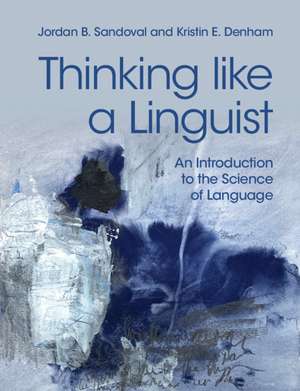Thinking like a Linguist: An Introduction to the Science of Language
Autor Jordan B. Sandoval, Kristin E. Denhamen Limba Engleză Paperback – 30 iun 2021
| Toate formatele și edițiile | Preț | Express |
|---|---|---|
| Paperback (1) | 194.08 lei 3-5 săpt. | +20.92 lei 5-11 zile |
| Cambridge University Press – 30 iun 2021 | 194.08 lei 3-5 săpt. | +20.92 lei 5-11 zile |
| Hardback (1) | 616.48 lei 3-5 săpt. | |
| Cambridge University Press – 30 iun 2021 | 616.48 lei 3-5 săpt. |
Preț: 194.08 lei
Nou
Puncte Express: 291
Preț estimativ în valută:
37.14€ • 38.87$ • 30.91£
37.14€ • 38.87$ • 30.91£
Carte disponibilă
Livrare economică 10-24 martie
Livrare express 22-28 februarie pentru 30.91 lei
Preluare comenzi: 021 569.72.76
Specificații
ISBN-13: 9781316635209
ISBN-10: 1316635201
Pagini: 248
Dimensiuni: 189 x 246 x 13 mm
Greutate: 0.54 kg
Editura: Cambridge University Press
Colecția Cambridge University Press
Locul publicării:Cambridge, United Kingdom
ISBN-10: 1316635201
Pagini: 248
Dimensiuni: 189 x 246 x 13 mm
Greutate: 0.54 kg
Editura: Cambridge University Press
Colecția Cambridge University Press
Locul publicării:Cambridge, United Kingdom
Cuprins
Preface; Acknowledgements; 1. Introducing Language Analysis; 2. Analyzing Sound: Phonetics and Phonology; 3. Analyzing Structure: Morphology and Syntax; 4. Analyzing Meaning: Semantics and Pragmatics; 5. Analyzing Language: Putting It All Together; References; Index.
Recenzii
'Thinking like a Linguist is an excellent text for introducing students to the scientific methods and core areas of linguistics. Clear and crisply written by two experienced professors, the book focuses on the analysis of sound, structure, and meaning – phonetics to pragmatics – and how to do linguistic analysis. With up-to-date coverage, interesting applications, and well-thought-out activities and exercises from a variety of languages, this is a versatile, sensitive, and intellectually engaging text, suitable for undergraduate and graduate introductions to linguistic analysis.' Edwin Battistella, Southern Oregon University
'A fresh and flexible approach to the study of linguistics. Because the three central chapters can be read in any order, instructors are free to adapt the book to their course and teaching style. A wide variety of activities encourage students to not only practice concepts from the text, but also to create connections between the textbook material and their own experiences.' Patti Kurtz, Minot State University
'This textbook offers a refreshing approach to linguistics, and cultivates an excitement for the study of language. It engages students by leading them through the formal aspects of linguistic analysis, and its enriching exercises encourage them to consider language from a range of perspectives.' Sam Rosenthal, Oakland University
'This clear introduction covers sound, structure, and meaning at a level appropriate for undergraduates coming to linguistics for the first time. With a steady progression, well-chosen exercises, and an engaging style, it shows beginners how to think about language scientifically. The final chapter demonstrates how linguists use the thinking introduced in the main three chapters to explore language in social settings.' Mikael Thompson, independent scholar
'A fresh and flexible approach to the study of linguistics. Because the three central chapters can be read in any order, instructors are free to adapt the book to their course and teaching style. A wide variety of activities encourage students to not only practice concepts from the text, but also to create connections between the textbook material and their own experiences.' Patti Kurtz, Minot State University
'This textbook offers a refreshing approach to linguistics, and cultivates an excitement for the study of language. It engages students by leading them through the formal aspects of linguistic analysis, and its enriching exercises encourage them to consider language from a range of perspectives.' Sam Rosenthal, Oakland University
'This clear introduction covers sound, structure, and meaning at a level appropriate for undergraduates coming to linguistics for the first time. With a steady progression, well-chosen exercises, and an engaging style, it shows beginners how to think about language scientifically. The final chapter demonstrates how linguists use the thinking introduced in the main three chapters to explore language in social settings.' Mikael Thompson, independent scholar
Notă biografică
Descriere
Integrated practice and discovery problems in various languages encourage students to think analytically and scientifically about language.
